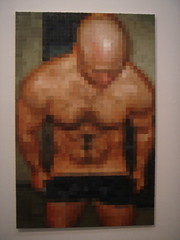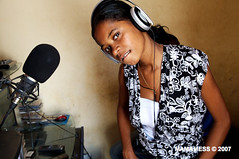Monday, March 31, 2008
Anti-climax
On Wednesday afternoon I got a call from my journalist friend. She was hunting for images of the multicultural clash in Slotervaart, one of Amsterdam's problem neighhbourhoods as characterised by the government. My friend told me on the phone that what they met were Dutch muslims fed up and tired to talk about the issue.
Wilders did not shot himself to grandiose lecturer fees and to international talk shows. His film was pulled off from all websites, he was blamed for using people's work without permission and - most importantly - people sort of consciously ignored his attack on islam after a day. The most common remark I heard was not irritation and anger, it was:"You know, I started watching it and it was really really boring and badly done. I just fastforwarded through it."
Ignoring was not only a Dutch reaction. Altogether it seems that Mr Wilders' attack was miscalculated and ineffective. I may still be proven wrong but as things are now, there is reason for joy. One should not underestimate one's audience, Mr Wilders: we just won't take any sort of crap.
Today on my way to work I glanced through Metro (flat tire, that's why the tram). Mediamatic - the brilliant Dutch new media and culture organisation - did it again: superb reaction to Wilders' film: www.fitna.nu
Saturday, March 29, 2008
Problem With Youth
Two years ago a gigantic mall called Kamppi was opened in the centre of Helsinki and today - as it would be a grand surprise - the Helsingin Sanomat newspaper writes about the way the teenagers have claimed it their space. They write about how these 13-17-year-olds hang out there every day. According to the article, teenagers come even from the neighbouring towns and municipalities to hang out.
The interviews with the adults really got me annoyed. You found shop owners and real estate maintenance people complaining that these teenagers are using this semipublic space. In the comments on the website under the article someone expressed their concern for the fact that teenagers hang out in a commercial space.However, in the pictures you saw not hoodlums but happy young people. The article described how the teenagers hug and high-five each other and how there seems to be a truly communal feeling.
These views by the adults are concerns that I hear in my work producing StrangerFestival often: public officials are extremely concerned that young people "don't realise" that there are so many services and places provided for them. That they just go and make their own things - a way of working boosted by the Internet.
I find myself often thinking that maybe the problem is that they actually do realise what is on offer but they do prefer spaces where no one tells them what they should be doing. Let's face it, It is guite human actually: none of us really enjoy being pushed around.
Most youth cultures have some sort of rebellion and DIY (Do It Yourself) mentality written into them. This seems very difficult for the well-meaning adults to handle who would rather wish to monitor and control the teenagers. The Kamppi shopping mall case reminds me of the fuss around the Main Post Office and Museum of Contemporary Art KIASMA when a lot of babyboomers and pensioners expressed their great concerns that young skateboarders were using the squares around these buildings for their own use and "even skateboarding around the statue of our national hero Mannerheim". My head is about to explode in discussions like this: the same people who brand teenagers are passive and disinterested, are actually dissing every phenomena where young people are entrepeneurial, visible and creative.
Tuesday, March 25, 2008
The Artist Was There When Life Happened
These quotes from an interview with Finnish artist Jani Leinonen in VELI magazine were very much in line with my feelings today as I walked through the exhibitions of the Museum of Contemporary Art KIASMA in Helsinki. I found myself being extremely moved by Nan Goldin's photography and one painting by Sami Lukkarinen (see pic). Let me try and explain why.
Goldin is a renowned American photographer who has made a career from documenting her own life and those usually considered to be on the downside: transsexuals, prostitutes, sexual minorities, victims of domestic violence, junkies and HIV positive people. Lukkarinen is a young Finnish star of the art world whose painting is part of a series where he worked with photos people used in their personal ads online.
Goldin's photos show people not at their best: with a bruised eye, sweaty and shiny forehead, bad hair day, in dirty underwear on a mattress that has turned brownish yellow surrounded by wallpaper that has lost its original colour ages ago. She shows people who look straight into the camera usually with a demanding look in their eyes, very seldom smiling. Goldin does not ask for pity for these people which a fresh and welcome take. She shows sex and life as they happen not in Hollywood but in cheap motels and run-down apartments. Her work shows human beings in full flesh, a bit scruffy but very present.
Lukkarinen's work then again shows people in the ways they see themselves at their best - often unconsciously reproducing common pornography and advertising imagery. They are not models but they push themselves out there, making themselves available for arousal and evaluation.
I found myself understanding and even supporting Leinonen's remark. I want art that makes me feel like something and says something about things that truly matter and which produces not just a new setting but a new meaning and an alternative way of looking. Goldin makes me face the side of our society not celebrated normally in the media and she shook a bit of my world. Both artists call for attention for life in its full which is what art should be doing.
Tuesday, March 18, 2008
Say My Name
Peled is an Israeli-born documentary maker who has for the last years focused on women in hip hop. She is currently working on Say My Name, a full-length documentary on female MCs and the women they inspire. She showed me the trailer and I found myself warming up from the inside. The strength of these women who are in the public eye characterised as rowdy and loud, was unbelievable. And the most amazing fact was that stars like Erykah Badu were completely shadowed by the normal women from the streets of Atlanta, New York and London. These girls kick ass.
I loved it, loved it, loved it. The trailer led us into a lengthy discussion on why these girls are so seldom heard and so often talked about. Through the interview we saw not rowdy but smart and frank women comfortable with their sexuality and opinions.
Nirit Peled works also with companies like Nike and MTV. It was brilliant to hear her insight on how these partnerships work. I am getting more and more convinced that often we in the non-profit sector could learn from commercial actors who seem to know how to tap into people's aspirations, how to talk to people directly and how to get them make and give their best. For instance a lot of these women take a lot of distance to classic feminism whereas a lot of women's organisations would see many of these openly sexual girls as victims of a chauvinist culture. Without dissing the protection agenda of the feminist movement, I would still claim that we should be using the modern means we have to make sure that as many of us as possible have the chance for a voice.
I really don't have problems with Nike, MTV and Dove making money by empowering women, I really don't. It is not like public funders would not have an agenda - sometimes it feels like the commercial funders are just much more honest with theirs.
Monday, March 17, 2008
Self Esteem Is What We Should Focusing On
As I was cycling to the gym today, my iPod (on shuffle) started playing this song from the Swedish glam band The Ark. I found myself listening to the lyrics in detail for the first time and realised that the message of this song is just briliant.
Last week I had a discussion at work on what does all this video making do to these teenagers. If they would feel like singer Ola Salo in this song, we would have reached a lot. The attitude he is propagating is wonderful: focusing on the essential for you, not on what others might find giving you stature.
Friday, March 14, 2008
Boys Will Be Boys
Halonen's election has had a positive impact on women in leading position in Finnish politics. I would claim to see a link between having a woman as a president since 2000 and finally in 2007 having a Cabinet where the majority of members are women. This makes me proud.
However, it would be still premature to claim that Finland has reached equality. We still need a lot of work when it comes to attitudes. I remember from my student politician years a number of situations where I felt that I got special attention and was taken more seriously because I was a man. I remember a stakeholder meeting/dinner which included sauna. As all the decisionmakers from the stakeholder were middle-aged men, all the women in our Board and Secretariat were instantly excluded from the intimate in-depth discussions which continued in the warmth of the sauna. That experience made me turn against mixing work and sauna (equals breaking a tradition in Finland). Real boys don't need old boys' clubs.
Recently an employee survey in the Finnish Parliament showed widespread sexual harrassment and dirty talk by the older male MPs towards the young female staff. This week's big scandal in Finland has been Minister for Foreing Affairs Kanerva's SMS escapade with an erotic dancer half his age. Finally yesterday Kanerva apologised publically and said that he showed lack of judgement.
I was highly pleased - and must confess, surprised - to hear that the youngish leader of Kanerva's party Kokoomus (National Coalition) condemned Kanerva's "sense of humour" so strongly. Minister of Finance Jyrki Katainen belongs to the generation that understands the harm of this kind of actions to his party's image. The last year's have made Kokoomus the party of educated nurses, teachers and young liberals and this kind of action by Kanerva drives easily a lot of these people to the Greens.
Thursday, March 13, 2008
Polished Like Gold
Call me a sentimental fool but this clip makes me smile and warms me up from the inside.
Monday, March 10, 2008
Our Shared Value
The Network Effect in Budapest gathered some 60 opinion makers from all across Europe with a strong Eastern European presence. It seemed to come as a surprise for some of the Western European participants that the East-West division was so present. This was most obvious in the discussion on the role of the nation and on ethnic diversity. This experience made me again wonder whose Europe are we talking about when we talk about common history and shared values.
When Western Europeans (myself included) were questioning the nation state, the Kosovar representatives were presenting their pictures from the independence celebrations some weeks back. When we (Brits, French, Dutch and some Nordics) got tangled into the Islam discussion, many of the participants could not really link it to their realities. And as we complained about the lack of energy in NGOs, the Russian and Ukrainian colleagues shared stories of personal excitement, engagement and risk-taking for things you believe in. It also felt that many people from the great old European powers tend to forget that for some of us independence is
1. rather recent
2. been contested rather recently
I sometimes wonder whether we could get further by recognising the differences out in the open rather than by pretending that we are all the same. I don't mean united in diversity, I mean saying things how they are, attempting to be precise and allowing confrontation. And above it all, asking questions rather than assuming. I caught myself assuming that a lot of people shared my Nordic ideals of parenthood only, to my surprise, finding myself defending equal parenthood alone in a group of five. And in the same way many people made great generalisations on the Nordic countries without recognising for instance the violent history of Finland.
I become more and more confident after experiences like this that the most powerful way to peace on the European level is to keep identity on hold and focus on areas such as common market, consumer protection, freedom of movement and environmental policy. Europe has to make sense, there are quite a few things already making us passionately believing in us and them.
p.s. Talking about image and reality: Finnish Minister for Foreign Affairs Ilkka Kanerva admitted today that he has sent over 200 flirtatious text messages to a woman half his age described in the Finnish media as an erotic dancer. It is not the first time he has been caught from this sort of behaviour. Before he was appointed as minister, he was caught promising position to young women in the Sports Word Championships. Then he promised to his parliamentary group to stop this sort of behaviour. This in the country which takes so much pride as a beacon of gender equality.
Monday, March 03, 2008
Dedication
There have been very few TV programmes that I remember capturing me in the same manner as BBC Two's Choir: Boys Don't Sing. The programme is a typical public broadcasting take on reality television: youth meets empowerment. The programme idea is fairly simple: Choirmaster Gareth Malone goes to an all boys' school with the goal of making sports boys love singing.
I work with young people and we often struggle with the issue of sustainability. Malone's dedication is something I see also in my work: people working on a local scale on a long-term basis making change happen. Due to its superlocal take, Malone's experiment can be duplicated: he shows how change in young people starts from believing in them, taking them seriously and getting personally and emotionally involved.
Every time I have seen the show it has made me cry. The way singing helps these boys in believing in themselves is what culture really is about. It gives recognition and blows your mind. And most importantly, Malone guaranteed that once he left the school with the camera crew, the school board had guaranteed a choirmaster for the future as well.
This is what I call public broadcasting.

















